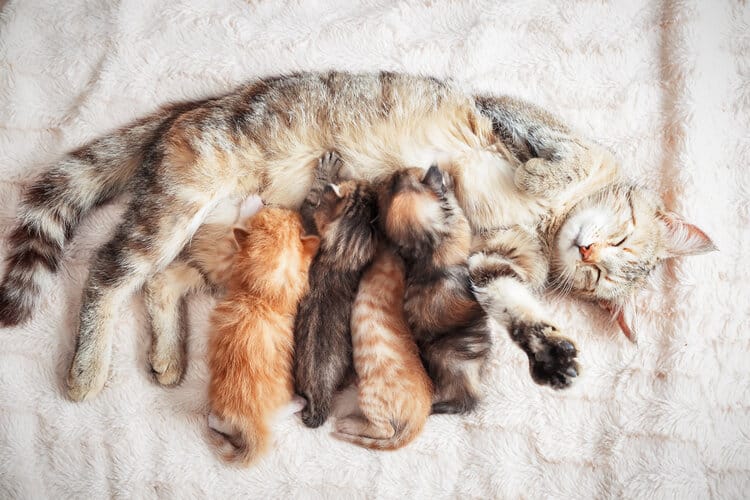
Taking care of a nursing mother cat can be time consuming, though, so we researched the best cat foods for nursing mother cats in Canada for you. We hope that these reviews will help you find suitable food for the new mom in your life.
A Quick Glance at Our Favorites in 2024
| Image | Product | Details | ||
|---|---|---|---|---|
| Best Overall |
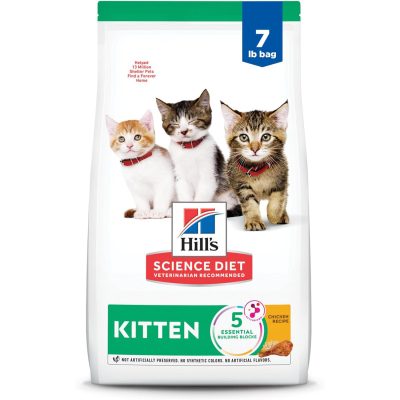
|
Hill’s Science Diet Kitten Dry Food |
|
CHECK PRICE |
| Best Value |
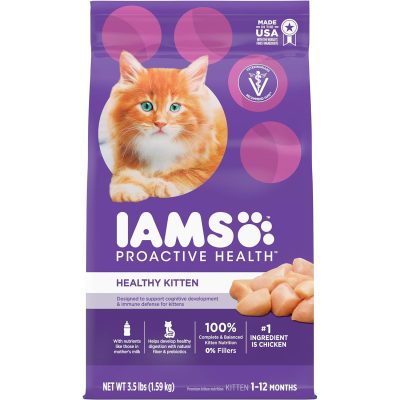
|
Iams Proactive Health Kitten Dry Food |
|
CHECK PRICE |
| Premium Choice |
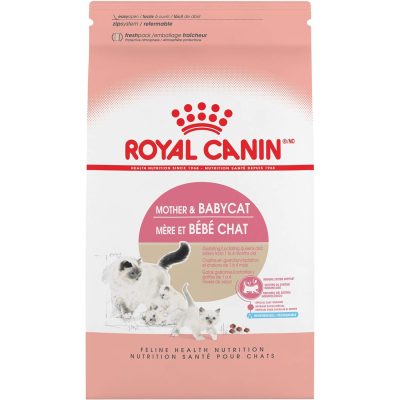
|
Royal Canin Mother & Babycat Dry Food |
|
CHECK PRICE |
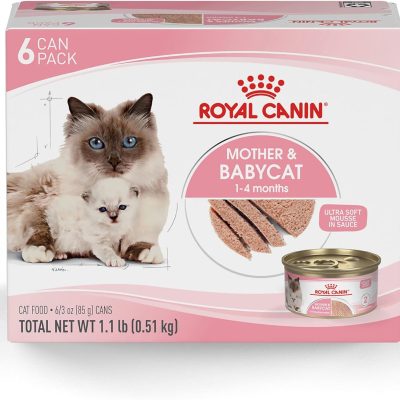
|
Royal Canin Mother & Babycat Mousse Cat Food |
|
CHECK PRICE | |
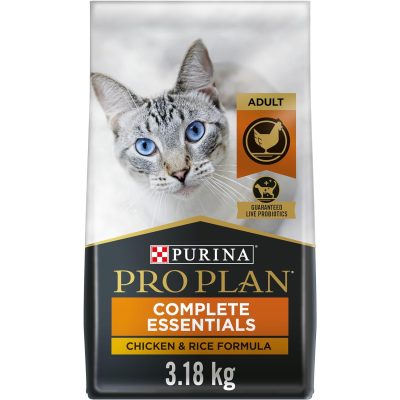
|
Purina Pro Plan High Protein Dry Cat Food |
|
CHECK PRICE |
The 10 Best Cat Foods for Nursing Mother Cats in Canada
1. Hill’s Science Diet Kitten Dry Food — Best Overall
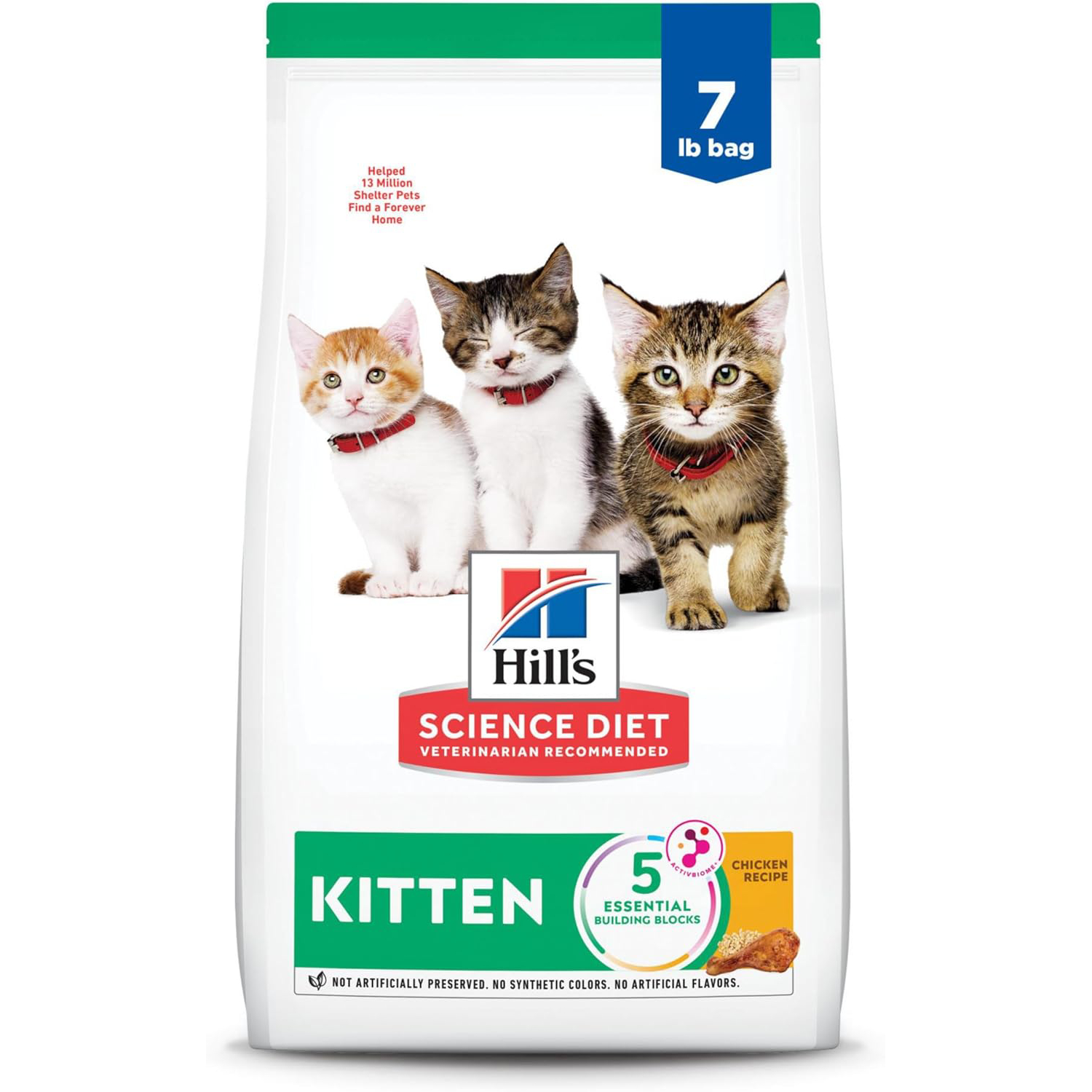
| Main ingredients: | Chicken, brown rice, wheat gluten |
| Protein content: | 37.8% |
| Fat content: | 23.5% |
| Calories: | 565 kcal/cup |
The overall best cat food for nursing mother cats in Canada is Hill’s Science Diet Kitten Dry Food. It’s made for kittens and nursing mothers and is therefore quite high in protein, fat, and calories. It contains DHA obtained from fish oil, which aids in eye and brain health, and it has the necessary vitamins and minerals for overall body health. This includes antioxidants for immune system support. It’s made with natural ingredients, with chicken as the main ingredient. But it is quite expensive.
- High in protein, fat, and calories
- DHA for brain and eye health
- Balanced vitamins and minerals for overall body health
- Antioxidants for the immune system
- Chicken is the main ingredient
- Expensive
2. Iams Proactive Health Kitten Dry Food — Best Value
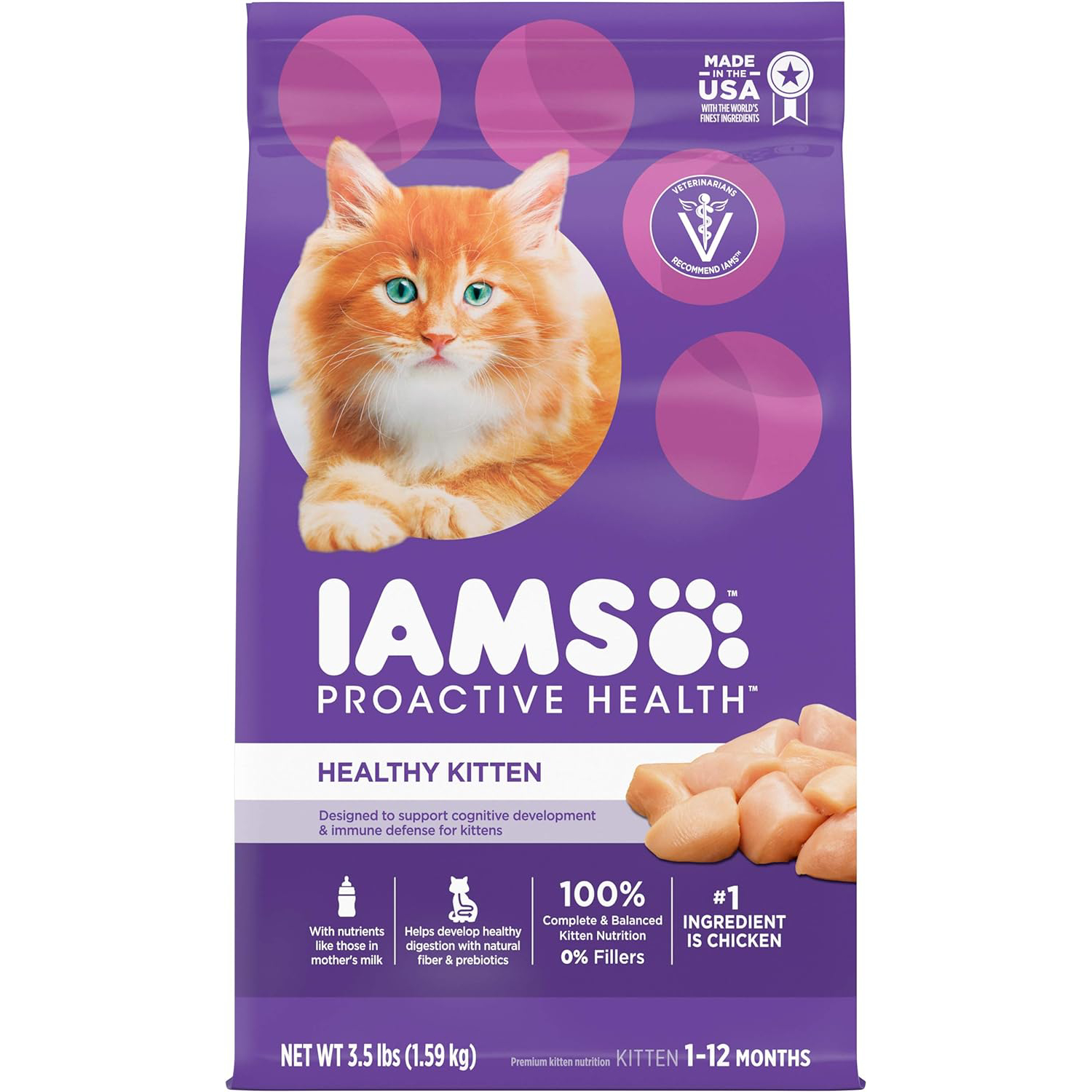
| Main ingredients: | Chicken, chicken by-product meal, ground whole-grain corn |
| Protein content: | 33% |
| Fat content: | 21% |
| Calories: | 484 kcal/cup |
The best cat food for nursing mother cats in Canada for the money is Iams Proactive Health Kitten Dry Food. It’s well-priced, and chicken is the first and main ingredient. Omega-3 DHA is added for brain health, along with vitamin E for a stronger immune system. There’s also natural fibre and prebiotics to aid in healthy digestion, as well as taurine for vision and heart health and calcium for strong bones. However, some cats just don’t like this food.
- Affordable
- Chicken is the main ingredient
- Added vitamin E and DHA for brain and immune system support
- Natural fibre and prebiotics for healthy digestion
- Taurine for vision and brain health
- Picky cats might not like it
3. Royal Canin Mother & Babycat Dry Food — Premium Choice
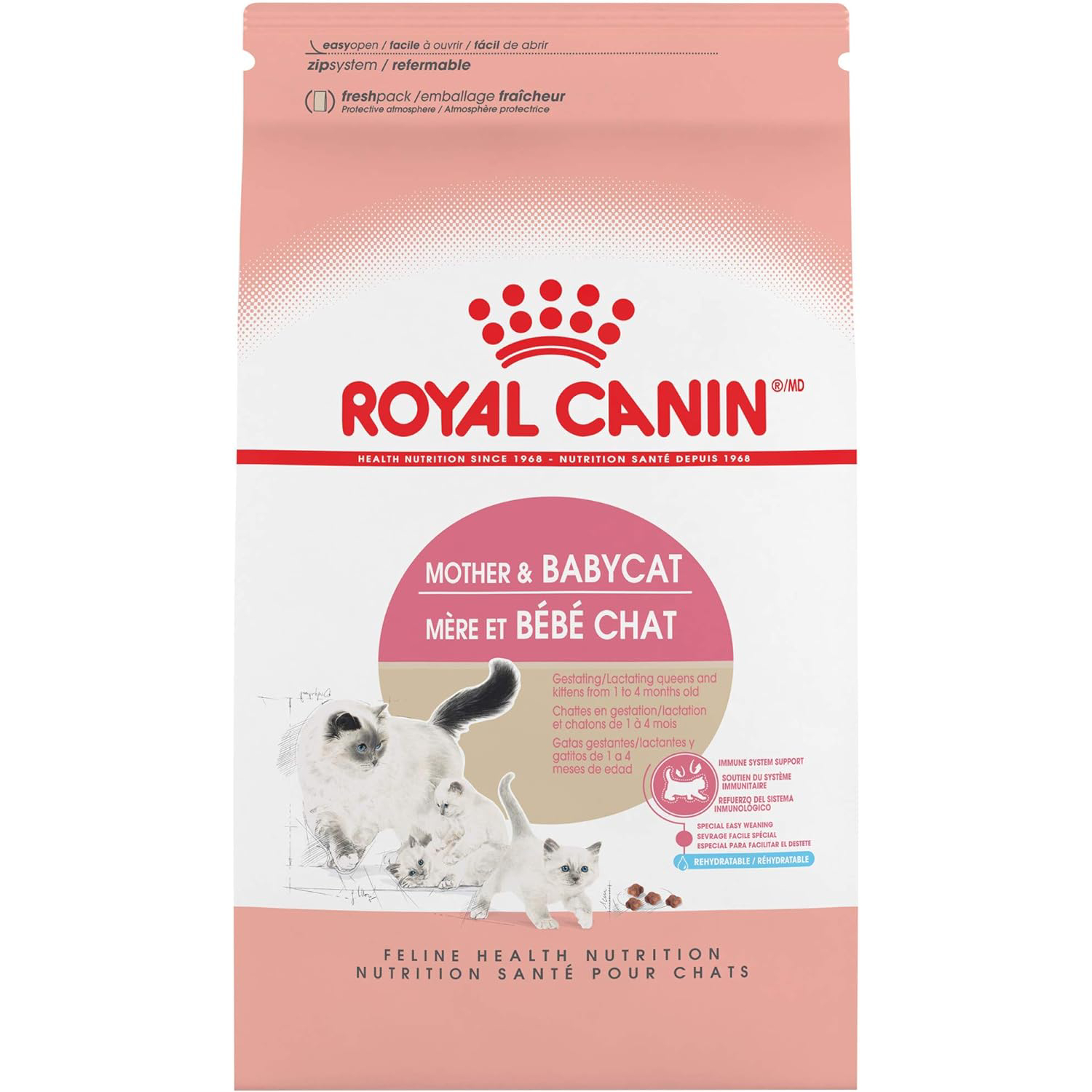
| Main ingredients: | Chicken by-product meal, chicken fat, brewers rice |
| Protein content: | 32% |
| Fat content: | 23% |
| Calories: | 479 kcal/cup |
Royal Canin’s Mother & Babycat Dry Food is our premium choice because it’s been formulated specifically for nursing mothers and can also be given to kittens aged 1 to 4 months. It has prebiotics and a variety of antioxidants, including vitamins C and E, lutein, and taurine. The prebiotics combined with the high protein aid digestion health, and the kibble can be rehydrated. However, it being a premium choice means it’s expensive.
- Formulated specifically for nursing mothers
- Also for young kittens ages 1–4 months
- Digestion health through prebiotics and high protein
- Combination of antioxidants, including lutein, taurine, and vitamins C and E
- Kibble can be rehydrated
- Expensive
4. Royal Canin Mother & Babycat Mousse Cat Food
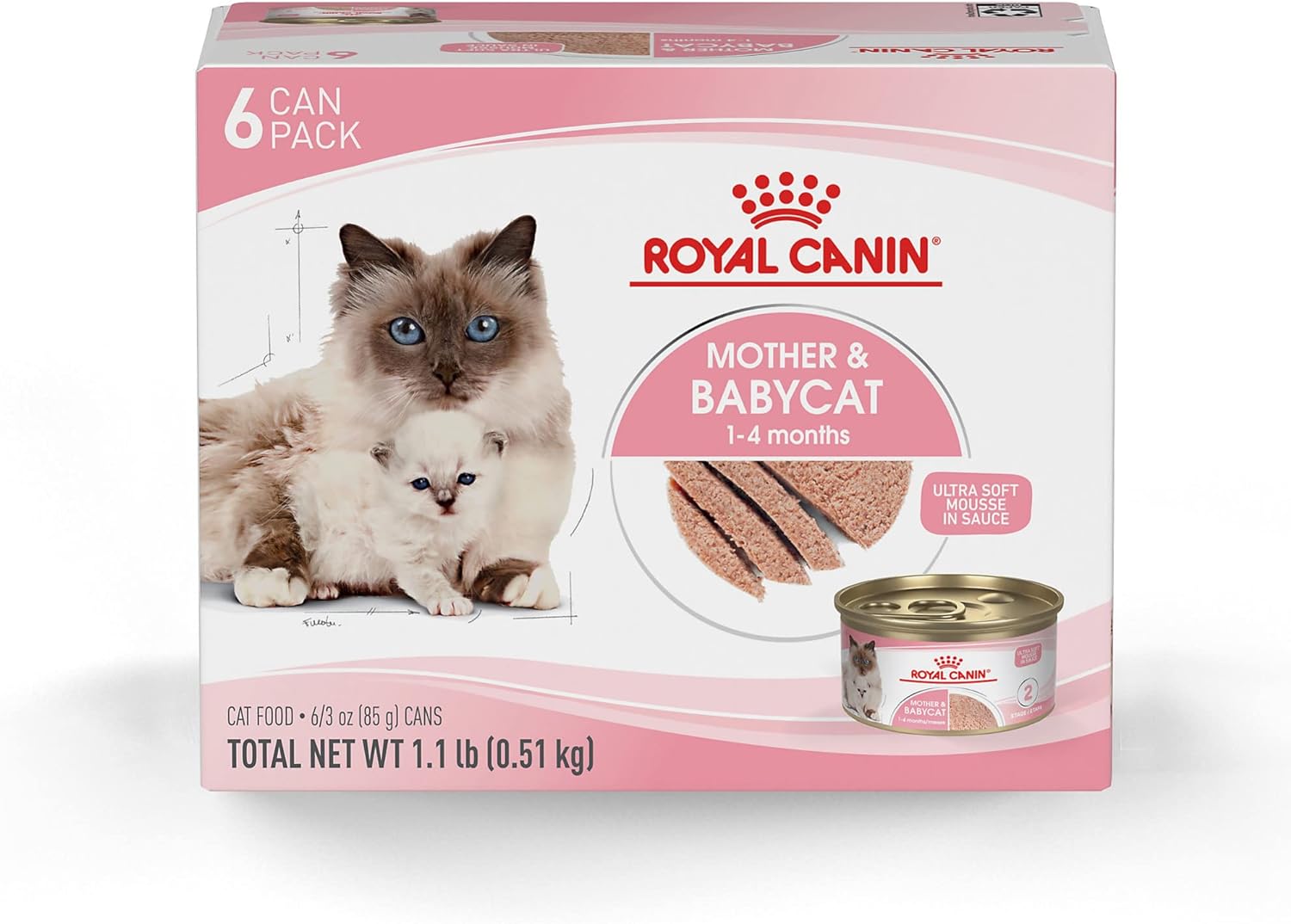
| Main ingredients: | Chicken liver, chicken, chicken by-products |
| Protein content: | 9% |
| Fat content: | 4% |
| Calories: | 78 kcal/can |
Royal Canin’s Mother & Babycat Mousse Cat Food is a canned version of Royal Canin’s Mother & Babycat Dry Food. It’s also formulated for nursing mothers and kittens that are 1 to 4 months old but is presented as a pâté in a fluffy, mousse-like texture for palatability. It has many of the same antioxidants and vitamins for overall body health and DHA for brain development. It also has digestible proteins and prebiotics for digestive system support. But it’s quite expensive.
- Made for nursing mothers
- Fluffy, mousse-like texture makes it palatable
- Antioxidants and vitamins for overall health
- Highly digestible proteins and prebiotics to aid digestion
- Expensive
5. Purina Pro Plan High Protein Dry Cat Food
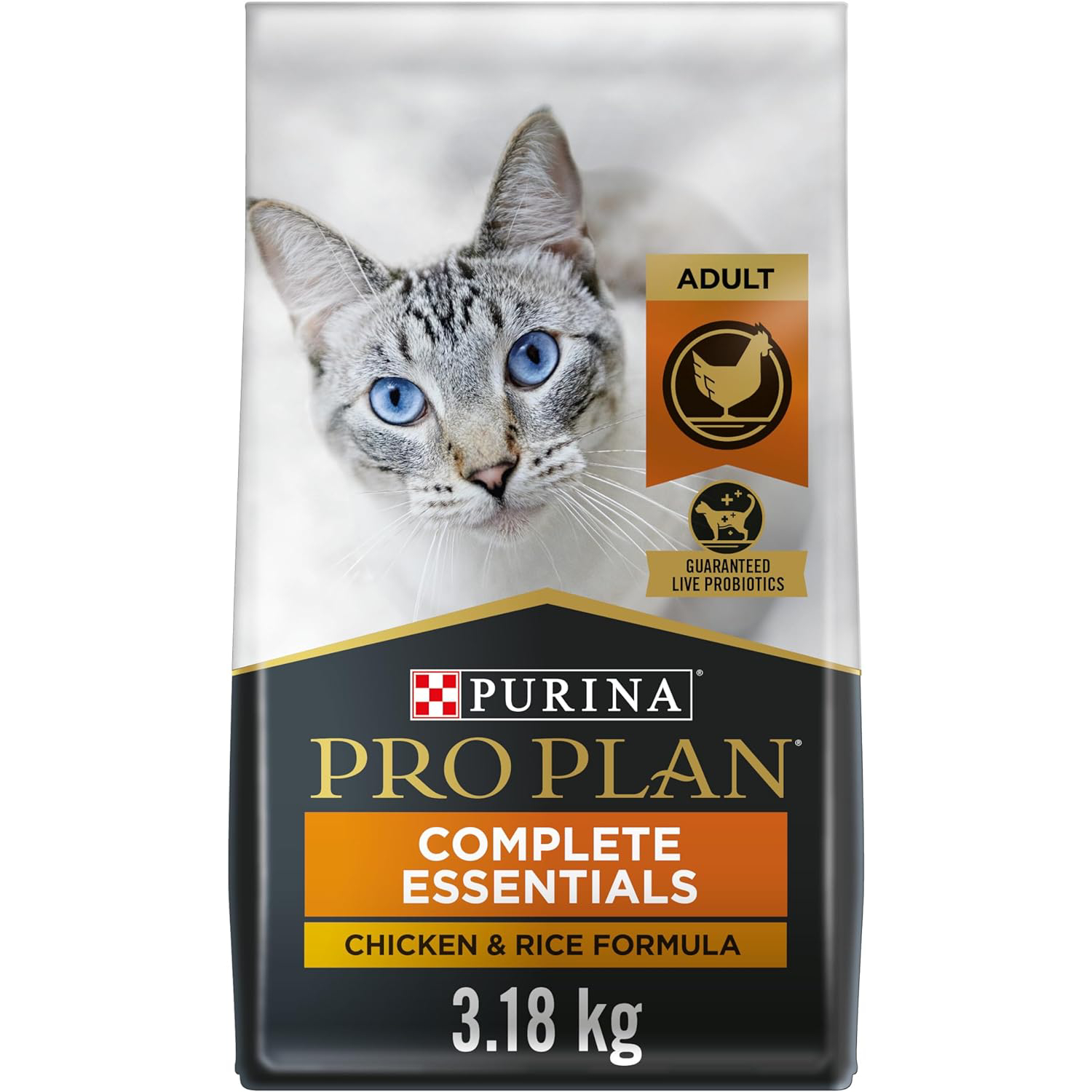
| Main ingredients: | Chicken, rice, corn gluten meal |
| Protein content: | 36% |
| Fat content: | 16% |
| Calories: | 494 kcal/cup |
Purina Pro Plan High Protein Dry Cat Food might not be geared for kittens and nursing mothers, but it’s high in protein, fat, and calories. Real chicken is the primary ingredient, and it includes linoleic acid and vitamin A for a healthy coat and skin. It has added antioxidants and live probiotics for immune and digestive system health. Finally, it includes a natural prebiotic fibre that also aids in digestion. Unfortunately, it seems to cause stomach upset in some cats.
- High in protein, fat, and calories
- Real chicken is the main ingredient
- Linoleic acid and vitamin A for coat and skin health
- Antioxidants and live probiotics for immune and digestive systems
- Might cause stomach upset in some cats
6. Purina Pro Plan Dry Kitten Food
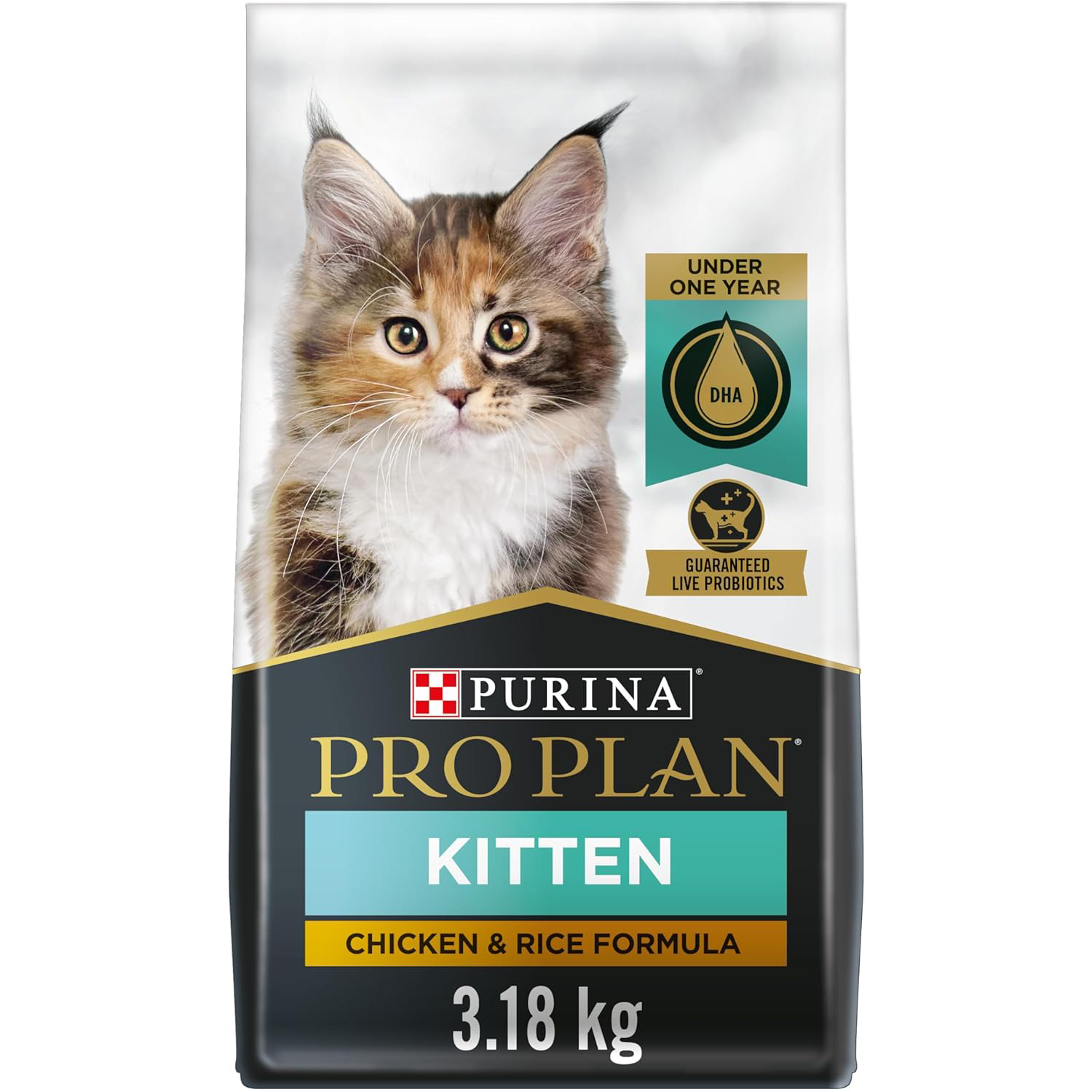
| Main ingredients: | Chicken, rice, corn gluten meal |
| Protein content: | 36% |
| Fat content: | 42% |
| Calories: | 534 kcal/cup |
Purina Pro Plan Dry Kitten Food is high in protein and contains chicken as the main ingredient. It has DHA for vision and brain health, as well as live probiotics for digestive and immune system support. It has plenty of antioxidants for additional immune system health, omega-6 for healthy coat and skin, and phosphorus and calcium for bone and teeth health. Unfortunately, it has been known to occasionally cause an upset stomach in some cats.
- Chicken is the main ingredient
- High in protein
- Live probiotics for digestion and immune system
- Antioxidants for more immune system support
- Phosphorus and calcium for teeth and bones
- Might cause stomach upset
7. Purina ONE Healthy Kitten Food
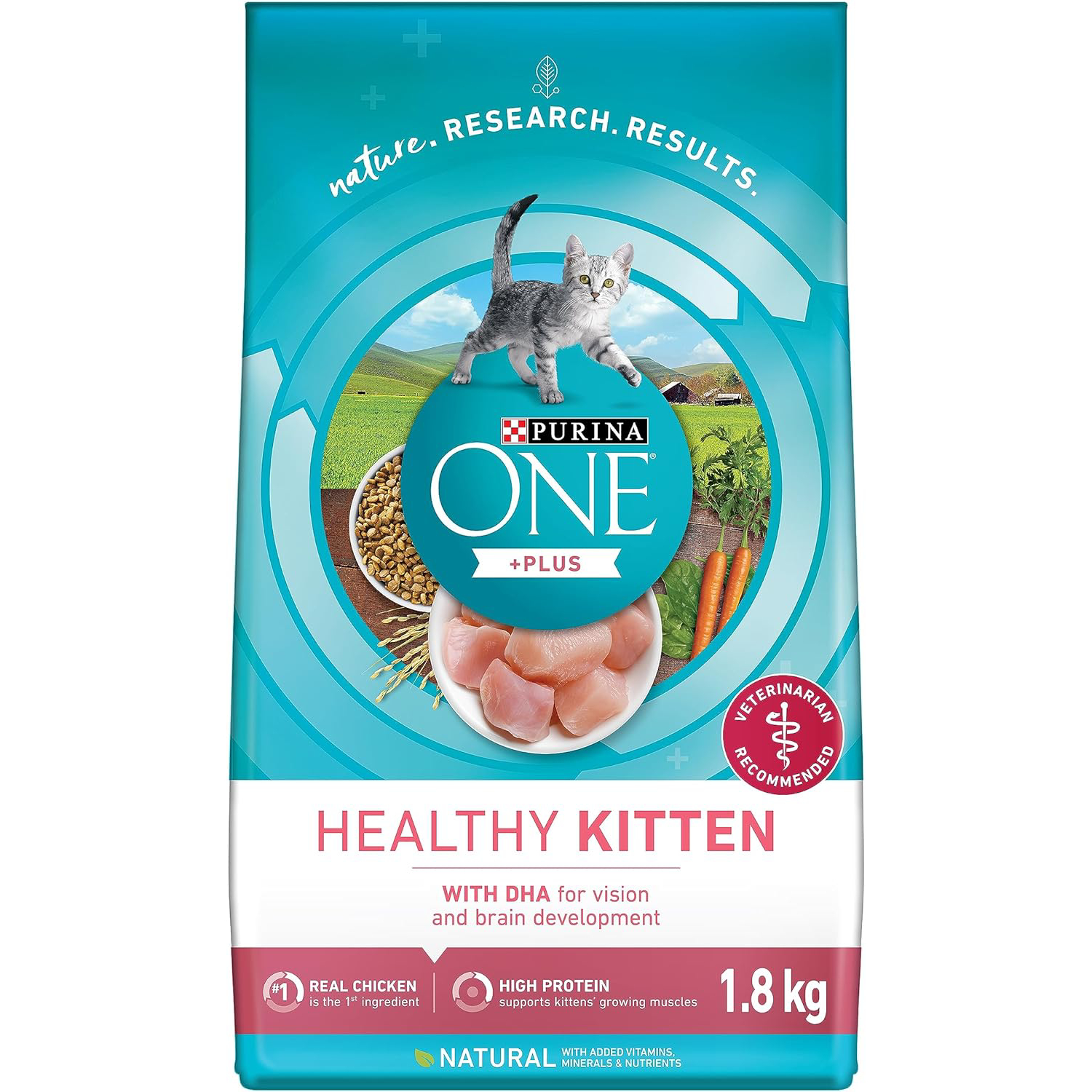
| Main ingredients: | Chicken, chicken by-product meal, corn gluten meal |
| Protein content: | 40% |
| Fat content: | 18% |
| Calories: | 514 kcal/cup |
Purina ONE Healthy Kitten Food is quite high in protein, fat, and calories and uses real chicken as the main ingredient. It contains DHA for brain and vision health and is made with natural ingredients with no fillers. It should help your cat’s coat by adding shine and is easily digested. It’s a high-quality food that is reasonably priced. But while it doesn’t have fillers, it does contain a large number of grain products, and some cats have developed slight stomach upset.
- High in protein, fat, and calories
- Real chicken is the main ingredient
- DHA for vision and brain health
- Natural ingredients with no fillers
- High quality and reasonably priced
- Contains many grains
- Stomach upset in some cats
8. Crave Indoor Adult Grain Free Cat Food With Protein
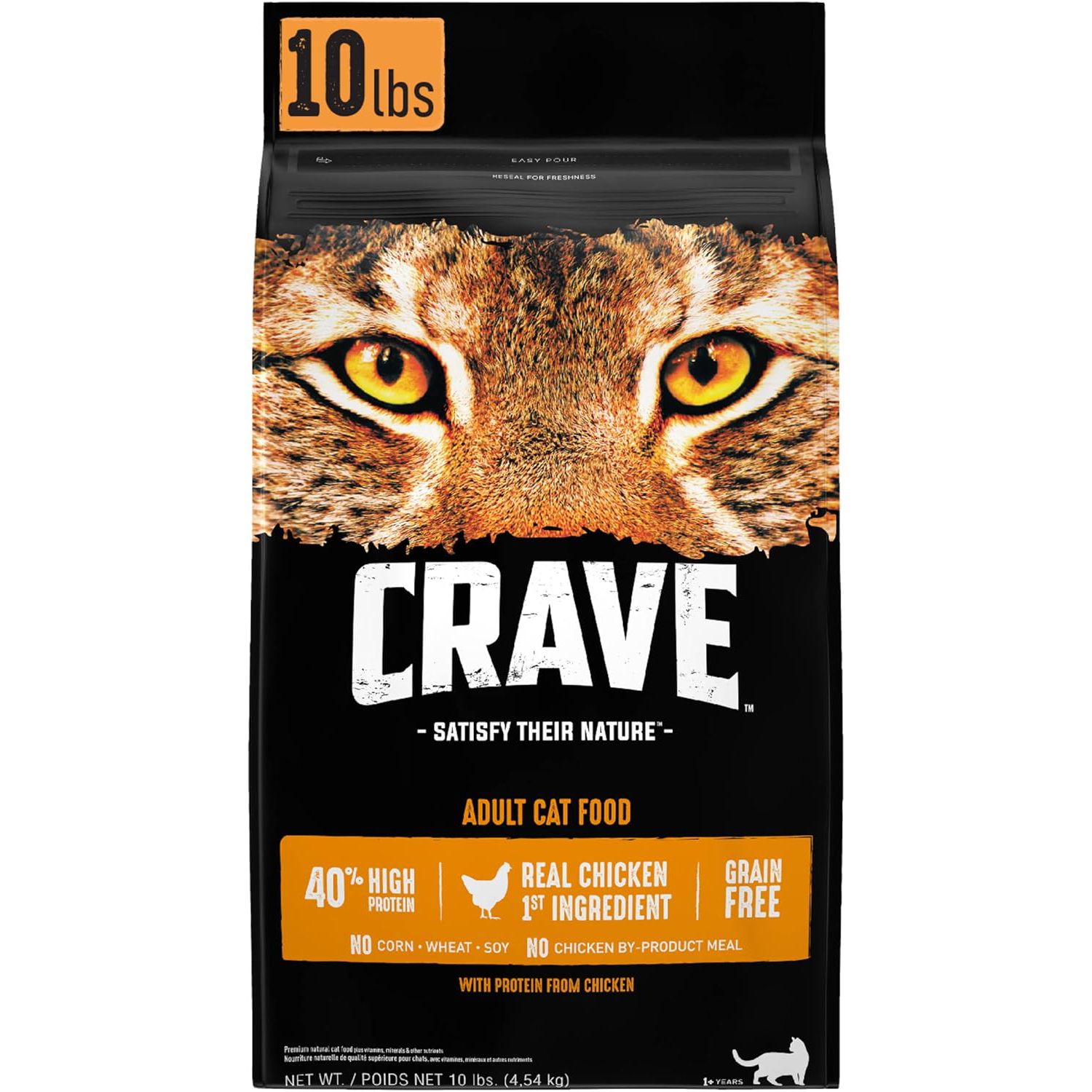
| Main ingredients: | Chicken, chicken by-product meal, corn gluten meal |
| Protein content: | 40% |
| Fat content: | 18% |
| Calories: | 514 kcal/cup |
Crave Indoor Adult Dry Cat Food With Protein is a good option if your cat isn’t supposed to eat grains because it’s grain free. Real chicken is the primary ingredient, and it’s quite high in protein with all the essential nutrients for supporting the immune and digestive systems. It doesn’t contain by-products or any artificial preservatives, flavours, or colours. It is expensive, though, and some cats have had an upset stomach after eating it.
- Grain free for cats that are sensitive to grains
- Real chicken is the main ingredient
- High in protein
- Doesn’t contain artificial ingredients
- Pricey
- Some cats might get an upset stomach
9. Fancy Feast Wet Kitten Food
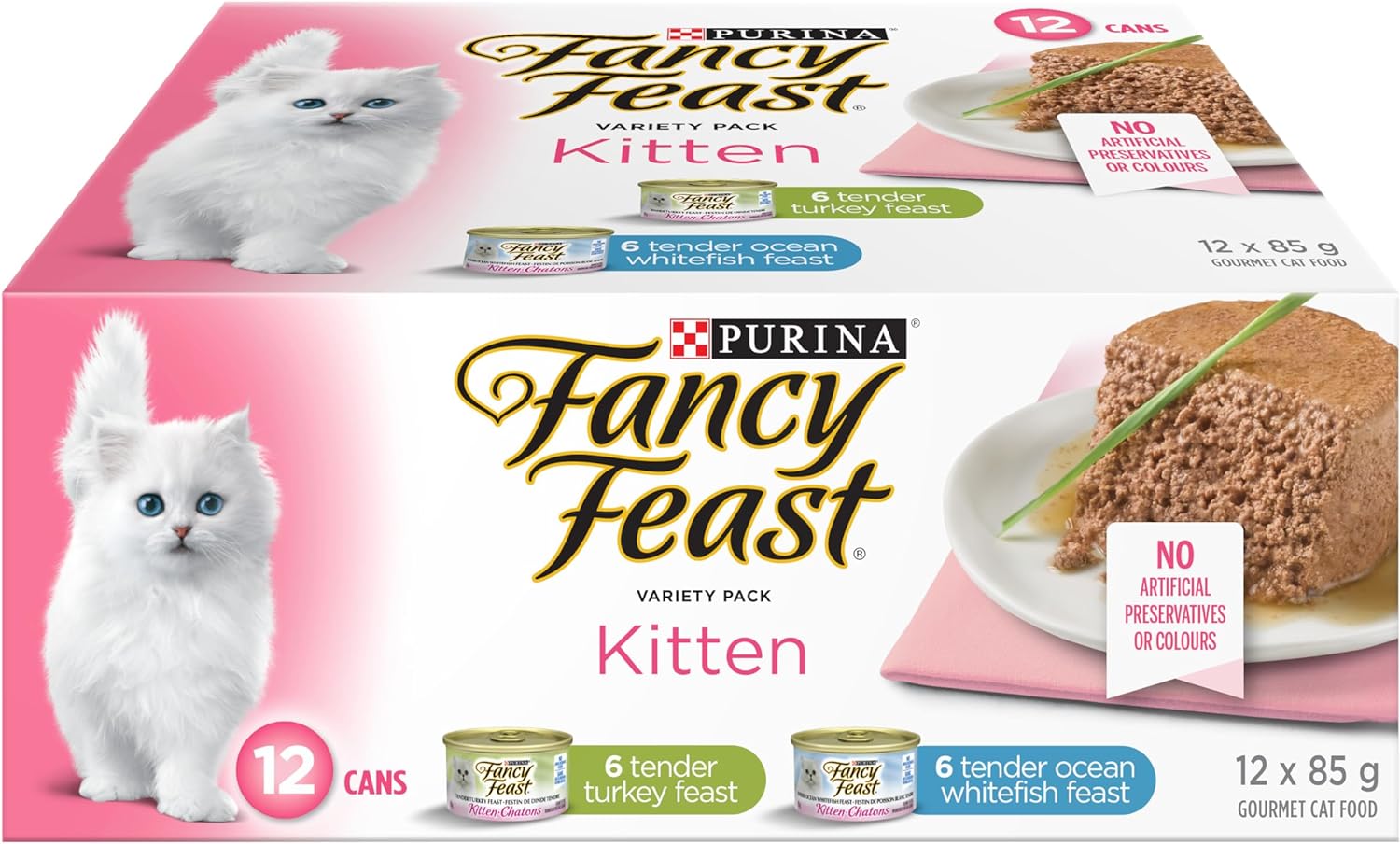
| Main ingredients: | Turkey, ocean whitefish, meat by-products |
| Protein content: | 12% & 11% |
| Fat content: | 4% & 5% |
| Calories: | 85 kcal/can & 95 kcal/can |
Fancy Feast Wet Kitten Food has two flavours to choose from in a tasty pâté: turkey and ocean whitefish. It has essential minerals and vitamins, including taurine for vision and heart health. It’s made with real milk and broth for added omegas, protein, and antioxidants. It’s also high in moisture content to keep your cat hydrated, and it’s affordable. But it contains artificial flavours and colours, and it might make some cats’ poop stinky.
- Two recipes: ocean whitefish and turkey
- Includes taurine for vision and heart health
- Made with milk and broth for protein, antioxidants, and omegas
- Affordable
- Might produce stinky poop
- Contains artificial ingredients
10. Blue Buffalo Wilderness Natural Kitten Dry Food
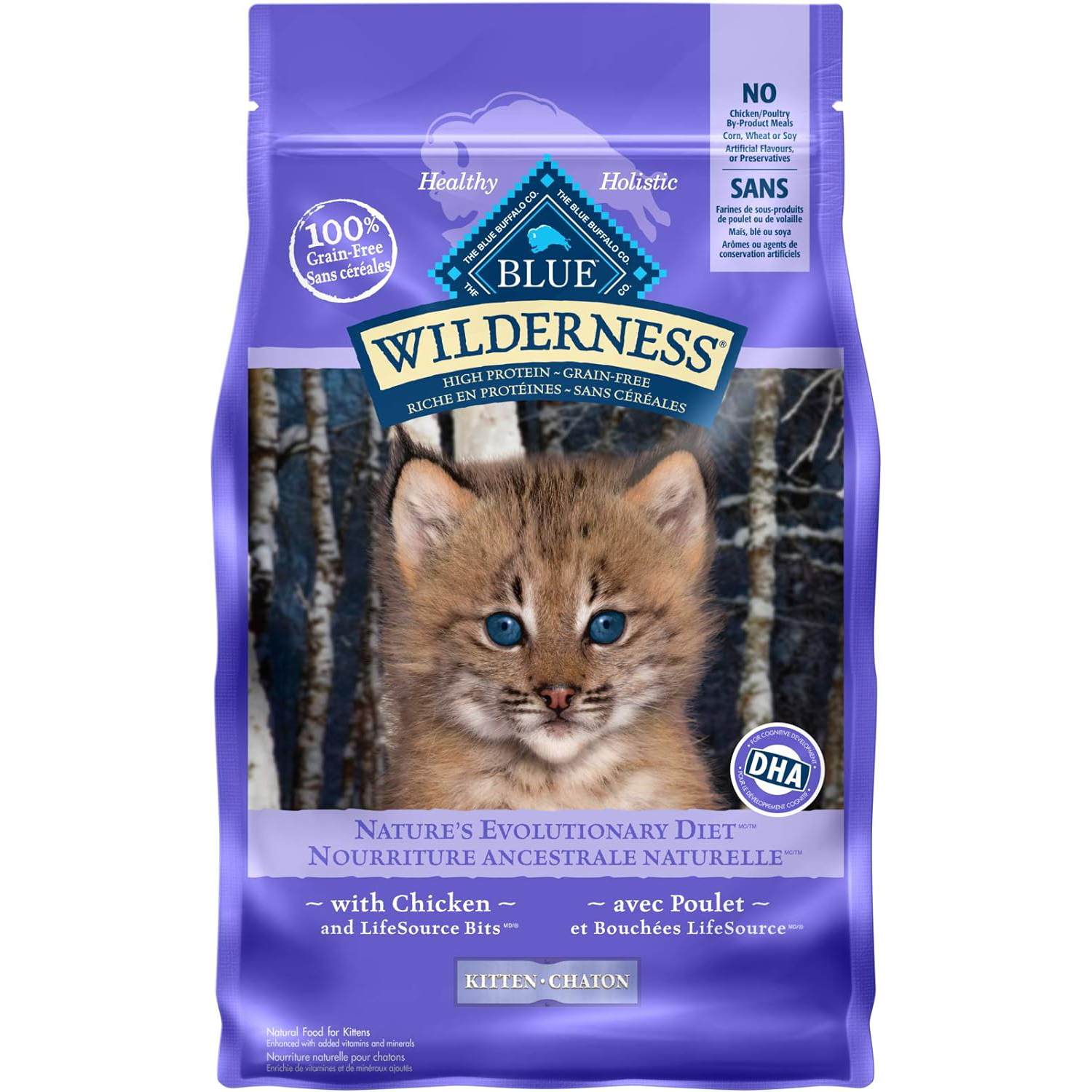
| Main ingredients: | Turkey, ocean whitefish, meat by-products |
| Protein content: | 12% & 11% |
| Fat content: | 4% & 5% |
| Calories: | 85 kcal/can & 95 kcal/can |
Blue Buffalo Wilderness Natural Kitten Dry Food has deboned chicken as the first and main ingredient and is quite high in protein and fat. It is grain free for cats that are sensitive to grains, and it does include ARA and DHA fatty acids and taurine for brain and eye health. It has LifeSource Bits, which are a concentrated blend of antioxidants, vitamins, and minerals. There are no by-products, grains, or artificial flavours or colours. However, it is expensive, and some cats develop stomach upset on this food.
- Deboned chicken is the main ingredient
- High in protein, fat, and calories
- Includes ARA and DHA fatty acids and taurine
- Includes LifeSource Bits for concentrated antioxidants, minerals, and vitamins
- No by-products or artificial ingredients
- Expensive
- Some cats might have stomach upset
Buyer’s Guide: How to Choose the Best Cat Food for Nursing Mother Cats
Now that you’ve had the chance to become more familiar with cat foods that are good for nursing mother cats, we can go over a few other points that can help you understand what you should be looking for. The nutritional requirements of a pregnant and nursing cat are quite different from those of a typical active adult cat.
What Are a Mother Cat’s Nutritional Requirements?
- She needs extra protein for the development and growth of her kittens.
- More calories for energy will aid in the kittens’ growth and support milk production.
- Extra calcium and phosphorus will aid the mother’s milk production and bone and teeth development of the kittens.
- Extra fat will help meet the demand for the extra calories that the mother requires.
- High digestibility allows for more calories but in a smaller amount of food.
Why Is Kitten Food Good for Nursing Cats?
Most of the food on this list is for kittens. When kittens are growing and developing, they need food high in protein, fat, calories, and extra calcium. This is exactly what a pregnant and lactating cat also needs, so most kitten foods are good for mother cats. In a pinch, you can also look for food labelled “high protein.”
Mother cats need the extra calories and protein not only to support their own dietary needs but also for their rapidly growing kittens. The extra fat and calories will give them the extra energy that they need for their own health and the health of their kittens.
How Much Should a Mother Cat Eat?
A nursing cat needs to eat more often than when she’s not pregnant or lactating. Leaving out food so she can eat at any time is better for her in the long run. She’ll likely end up eating small meals throughout the day.
However, as her kittens start to explore and are slowly being weaned onto solid food, you should begin to reduce the amount that she’s eating. Also, this way, the kittens won’t constantly get into her food.
Final Thoughts
Hill’s Science Diet Kitten Dry Food is our favourite because it’s made with natural ingredients and is high in fat, protein, and calories. Iams Proactive Health Kitten Dry Food has natural fibre and prebiotics to aid in healthy digestion, has calcium for stronger teeth and bones, and is an affordable price.
Royal Canin’s Mother & Babycat Dry Food is our premium choice because it’s been formulated specifically for nursing mothers. Likewise, Royal Canin’s Mother & Babycat Mousse Cat Food is a mousse-like pâté with antioxidants, highly digestible proteins, and prebiotics for digestive system support.
We hope that these reviews and research have helped you find the right food for your cat. Just ensure that she has the right kind of food and plenty of water, and you’ll have a happy and healthy mom. Don’t forget to take the time to enjoy those kittens!
Featured Image Credit: Image Credit: Rashid Valitov, Shutterstock
Contents
- A Quick Glance at Our Favorites in 2024
- The 10 Best Cat Foods for Nursing Mother Cats in Canada
- 1. Hill’s Science Diet Kitten Dry Food — Best Overall
- 2. Iams Proactive Health Kitten Dry Food — Best Value
- 3. Royal Canin Mother & Babycat Dry Food — Premium Choice
- 4. Royal Canin Mother & Babycat Mousse Cat Food
- 5. Purina Pro Plan High Protein Dry Cat Food
- 6. Purina Pro Plan Dry Kitten Food
- 7. Purina ONE Healthy Kitten Food
- 8. Crave Indoor Adult Grain Free Cat Food With Protein
- 9. Fancy Feast Wet Kitten Food
- 10. Blue Buffalo Wilderness Natural Kitten Dry Food
- Buyer’s Guide: How to Choose the Best Cat Food for Nursing Mother Cats
- What Are a Mother Cat’s Nutritional Requirements?
- Why Is Kitten Food Good for Nursing Cats?
- How Much Should a Mother Cat Eat?
- Final Thoughts













